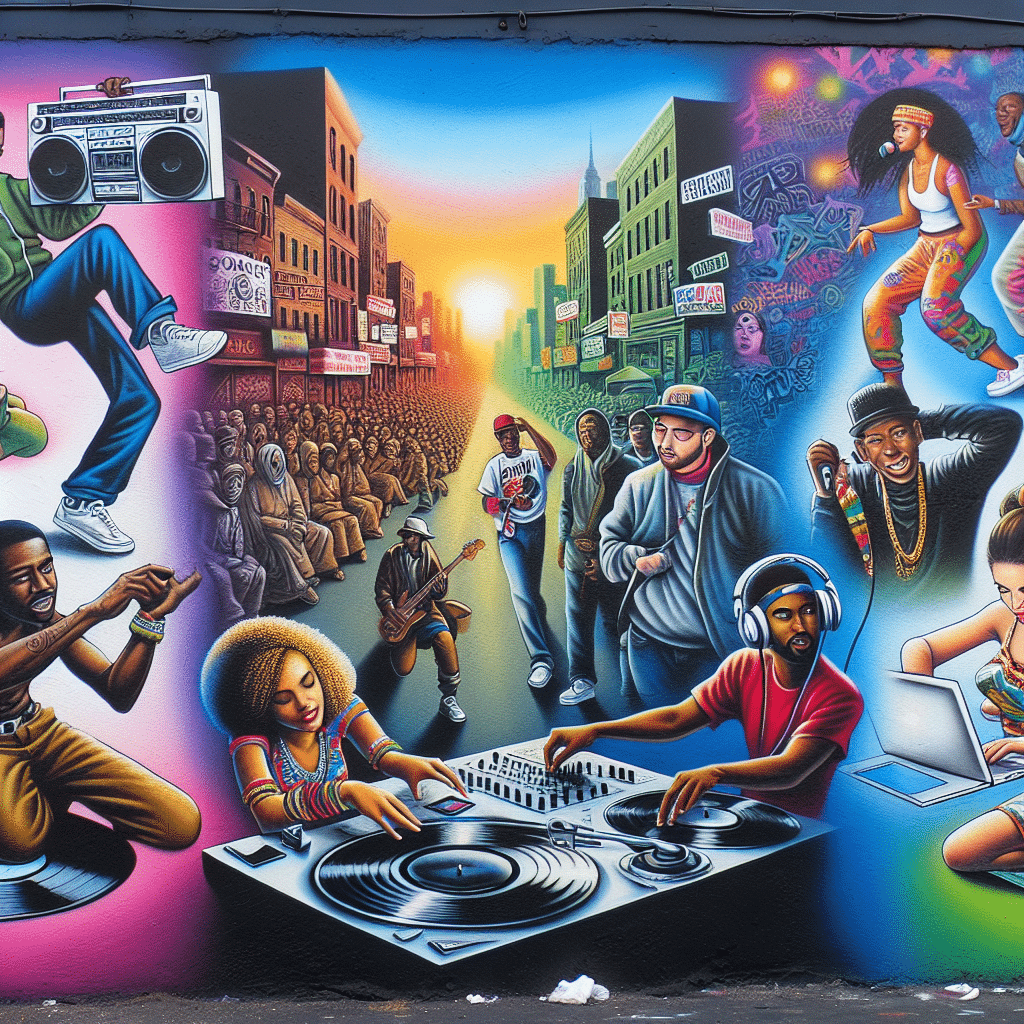The Evolution of Hip Hop: How Today's Artists are Shaping the Genre

Hip hop, a cultural and musical movement that originated in the Bronx, New York City, in the 1970s, continues to evolve and influence societies around the globe. What started as a local phenomenon has transformed into a dominant musical genre of the 21st century, permeating various aspects of culture, art, and social commentary. This article explores how today's hip-hop artists are shaping the genre and fostering its evolution while retaining its roots in storytelling, rhythm, and community engagement.
- The Origins of Hip Hop
- The Golden Age of Hip Hop
- The Late 1990s to Early 2000s: Mainstream Success
- Contemporary Hip Hop: Fusion and Diversity
- Lyrical Evolution: From Party Anthems to Social Commentary
- The Role of Technology in Hip Hop Evolution
- The Cultural Impact of Today's Artists
- Conclusion: The Importance of Evolution in Hip Hop
- FAQs
The Origins of Hip Hop
To understand the evolution of hip hop, one must first appreciate its origins. Hip hop emerged as a cultural response to socio-economic conditions, filled with narratives reflecting the realities of marginalized communities. The four fundamental elements that define hip hop are MCing (rapping), DJing, graffiti art, and breakdancing. Pioneers such as DJ Kool Herc, Grandmaster Flash, and Afrika Bambaataa laid the groundwork, utilizing innovative techniques like breakbeat sampling and turntablism.
In its infancy, hip hop served as a voice for the underrepresented, channeling sentiments of resistance and resilience. Artists like the Sugarhill Gang and Run-D.M.C. brought hip hop into mainstream culture in the late ’70s and ’80s, setting the stage for future generations.
See Also: The Beatmakers Behind the Hits: Spotlight on Hip Hop's Unsung Heroes
The Beatmakers Behind the Hits: Spotlight on Hip Hop's Unsung HeroesThe Golden Age of Hip Hop
The late 1980s to early 1990s is often referred to as the "Golden Age of Hip Hop," characterized by eclectic sounds, diversity in lyrical content, and artistic innovation. Artists like A Tribe Called Quest, Public Enemy, and Nas pushed creative boundaries and brought political awareness into their lyrics. This period reinforced hip hop as an art form and a medium for social change.
However, as hip hop gained popularity, it also faced commercialization, leading to a shift towards more marketable sounds and themes. Despite this shift, many artists remained committed to the core values of hip hop, intertwining their artistry with activism and social critique.
The Late 1990s to Early 2000s: Mainstream Success
As hip hop evolved into the new millennium, it began to dominate the music charts, with heavyweights like Jay-Z, Eminem, and 50 Cent becoming global icons. The commercialization of hip hop was evident as the genre found its way into various media, from Hollywood to fashion. This era introduced the concept of "hip hop culture" beyond music, blending it with lifestyle, fashion, and entrepreneurship.
See Also: Breaking Down Barriers: The Social Commentary in Hip Hop Lyrics
Breaking Down Barriers: The Social Commentary in Hip Hop LyricsThe rise of the internet and digital platforms also transformed music consumption. Hip hop artists began utilizing platforms like MySpace and later, social media, to connect with fans, distribute their music, and build their brands. This shift not only democratized the music industry but also allowed independent artists to flourish.
Contemporary Hip Hop: Fusion and Diversity
Today’s hip hop is a melting pot of genres and influences, drawing from R&B, electronic, punk, and trap music. This fusion has led to a diverse soundscape, with artists like Travis Scott, Kendrick Lamar, and Lil Nas X redefining the genre's boundaries. Trap music, characterized by its heavy use of hi-hats and rhythmic snares, has become a defining sound of contemporary hip hop.
Moreover, Asian, Latin, and African influences are increasingly prominent in hip hop, reflecting global diversity. Artists like Bad Bunny and BTS have broken through cultural barriers, proving that hip hop can transcend boundaries. The genre has become a powerful tool for cultural exchange, collaboration, and creativity, enabling a deeper understanding of various backgrounds and experiences.
See Also:
 Beyond Beats: The Cultural Impact of Top Hip Hop Artists
Beyond Beats: The Cultural Impact of Top Hip Hop ArtistsContemporary hip hop artists are not just entertainers; they often serve as social commentators. Current themes in hip hop address issues such as systemic racism, mental health, and police brutality. Kendrick Lamar's "To Pimp a Butterfly" is a monumental album that delves into the Black experience in America, celebrating identity while confronting internalized and external struggles.
Similarly, artists like J. Cole and Logic bring awareness to mental health, advocating for open conversations surrounding emotional well-being. This evolution from party anthems to profound storytelling demonstrates hip hop's capacity to engage in social dialogue and influence cultural change.
The Role of Technology in Hip Hop Evolution
The technological advancements of the 21st century have significantly impacted the evolution of hip hop. Streaming platforms like Spotify and Apple Music have revolutionized how artists distribute their music and engage with listeners. Social media tools have allowed artists to cultivate personal brands, connect with fans in real-time, and respond to societal issues as they arise.
Additionally, the rise of bedroom producers and digital audio workstations (DAWs) has democratized music production, giving aspiring musicians unprecedented access to high-quality production resources. This accessibility empowers creators, fosters innovation, and encourages experimentation within the genre.
See Also: From Underground to Mainstream: The Rise of Hip Hop's Newest Stars
From Underground to Mainstream: The Rise of Hip Hop's Newest StarsThe Cultural Impact of Today's Artists
Today’s hip hop artists are influential not just musically but culturally as well. They set trends in fashion, language, and social issues. Figures such as Cardi B and Megan Thee Stallion embody empowerment and redefine femininity in hip hop, challenging traditional gender roles and expectations.
Moreover, platforms like TikTok provide contemporary hip hop artists with new opportunities to reach audiences. Viral challenges centered around songs have the power to elevate tracks into mainstream hits quickly, showcasing the dynamic relationship between technology and music consumption.
Conclusion: The Importance of Evolution in Hip Hop
The evolution of hip hop is not just a narrative of musical progression; it reflects the changing landscape of society and culture. Today’s artists are at the forefront, shaping the genre through their innovative sounds, social commentary, and collaboration across cultures. As hip hop continues to evolve, it retains its essence as a vehicle for storytelling, collective experience, and cultural commentary.
See Also: Voices of a Generation: The Top Hip Hop Artists Making Waves in 2023
Voices of a Generation: The Top Hip Hop Artists Making Waves in 2023The ongoing growth of hip hop emphasizes the importance of adapting to societal changes while staying true to its roots. This dynamic nature ensures that hip hop remains relevant and influential, empowering the next generation of artists and fans alike.
FAQs
Q1: How has technology influenced hip hop music?
A1: Technology has vastly influenced hip hop through digital platforms for music distribution, social media for engagement, and music production software that allows aspiring artists to create quality music easily.
Q2: Who are some of the most influential contemporary hip hop artists?
See Also: From the Studio to Your Speakers: The Latest in Rap Music
From the Studio to Your Speakers: The Latest in Rap MusicA2: Influential contemporary hip hop artists include Kendrick Lamar, J. Cole, Lil Nas X, Cardi B, and Travis Scott, known for their unique contributions to the genre and its cultural impact.
Q3: What themes do modern hip hop artists often explore in their lyrics?
A3: Modern hip hop artists frequently explore themes of systemic racism, mental health, and empowerment, using their platform to raise awareness and promote social change.
Q4: How has hip hop transcended cultural boundaries?
A4: Hip hop has become a global phenomenon, with artists from diverse backgrounds incorporating their cultural influences, leading to collaborations that enrich the genre and broaden its appeal.
See Also: Rhymes and Reasons: Exploring the Evolution of Hip-Hop Culture
Rhymes and Reasons: Exploring the Evolution of Hip-Hop CultureQ5: What is the future of hip hop?
A5: The future of hip hop lies in its continued evolution, fueled by innovation, collaboration, and the ability to address contemporary societal issues, ensuring its relevance in an ever-changing cultural landscape.
If you want to know other articles similar to The Evolution of Hip Hop: How Today's Artists are Shaping the Genre you can visit the category Hip Hop.
